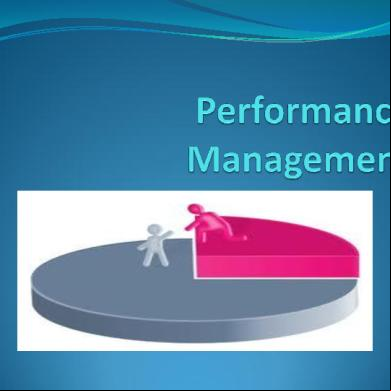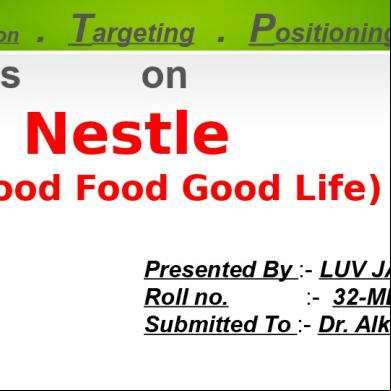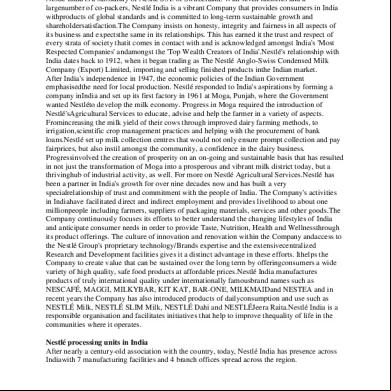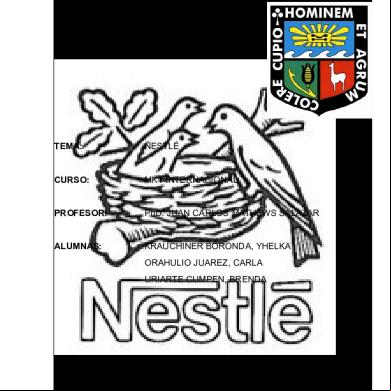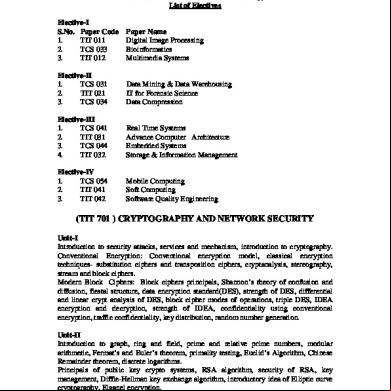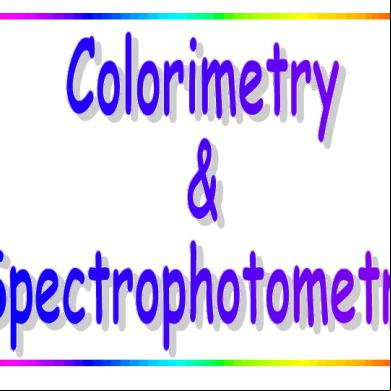Pms Nestle 4d4p3g
This document was ed by and they confirmed that they have the permission to share it. If you are author or own the copyright of this book, please report to us by using this report form. Report 2z6p3t
Overview 5o1f4z
& View Pms Nestle as PDF for free.
More details 6z3438
- Words: 542
- Pages: 16
Performance Management System
PMS
1
Performance Management System • Performance management is the continuous process of identifying, measuring and evaluating the performance of the individuals and teams and aligning their performance with the organizational goals. • A process that significantly affects organizational success by having managers and employees work together to set expectations, review results and reward performance. PMS
2
PERFORMANCE MANAGEMENT PROCESS Set Goals
Communicate
Evaluate
Observe
PMS
3
Performance Management Continuous
Goal directed
Revaluation PMS
4
Why Performance Management ? Total Quality
Traditional performance appraisal are often tense and counterproductive
Strategic planning PMS
5
Why Nestle considers PMS important?
• Nestlé India recognizes that people make the difference • encourages and s its people to inculcate the clearly laid down Nestlé India Leadership Principles • Nestlé India will push you to broaden your horizon, both nationally & internationally • Nestlé India believes in giving as much responsibility as possible to the individual PMS 6
Nestle grows talent & teams • ion for building and sustaining an environment where people have a sense of personal commitment to their work • Understands the importance of continuous learning and improvement • committed to giving and receiving honest, accurate and timely • Believes in the importance of building diverse teams, and promotes the advantages of gender balance PMS
7
Why PM is difficult ? •Job/Outcomes not quantified •Personal relationships with employees •Unable to give criticism •Personality biases •Poor communication •Conflicting goals
PMS
8
Techniques of PM • • • • • •
Essay (open-ended) Management by Objective Ranking Behaviorally Anchored Ratings (BARS) Critical Incidents Forced Distribution
PMS
9
Performance Management Techniques used by Nestle Balanced Scorecard Linked System • A strategic planning and management system •Originated by Dr. Robert Kaplan (Harvard Business School) and David Norton as a performance measurement framework
PMS
10
Balance Scorecard Design Process •Translating the vision into operational goals •Communicating the vision and link it to individual performance •Business planning; index setting • and learning, and adjusting the strategy accordingly PMS
11
Nestle Performance Scorecard Measurements Standards
Manager’s assessment
Leadership, Ethics/Integrity Customer Interaction Community Involvement Contribution to Overall Business People Performance Teamwork Training & Development Employee Satisfaction
Manager’s assessment
Below Par
Par
Abov e Par
Nestle Performance Scorecard.. Measurements Customer Satisfaction
External company survey Goal of 80%
Strategy Implementation
Objective standards
Households Cross-sell, splits, mergers Retail asset balances Market share Financial Revenue Expense Margin
Objective stadards
Below Par
Par
Abov e Par
Essay Technique • Describe in detail the quantity and quality of the employee’s performance during the past twelve months • Describe the employee’s strength and weakness • How do you describe the employee’s potential within the company? • What leadership skills does the employee bring to the job? • What future development activities do you recommend for the employee? PMS
14
Challenges • • • • • • • •
Lack of integration Design challenges Lack of leadership Implementation failure Incompetence Communication challenges Lack of monitoring Lack of evaluation PMS
15
Areas Areas of of Improvement Improvement • Use practical tools to improve employee performance • Use a sound framework for performance development • Rely on multiple sources of information • Identify key job performance dimensions • Develop a structured process and reliable measures
PMS
16
PMS
1
Performance Management System • Performance management is the continuous process of identifying, measuring and evaluating the performance of the individuals and teams and aligning their performance with the organizational goals. • A process that significantly affects organizational success by having managers and employees work together to set expectations, review results and reward performance. PMS
2
PERFORMANCE MANAGEMENT PROCESS Set Goals
Communicate
Evaluate
Observe
PMS
3
Performance Management Continuous
Goal directed
Revaluation PMS
4
Why Performance Management ? Total Quality
Traditional performance appraisal are often tense and counterproductive
Strategic planning PMS
5
Why Nestle considers PMS important?
• Nestlé India recognizes that people make the difference • encourages and s its people to inculcate the clearly laid down Nestlé India Leadership Principles • Nestlé India will push you to broaden your horizon, both nationally & internationally • Nestlé India believes in giving as much responsibility as possible to the individual PMS 6
Nestle grows talent & teams • ion for building and sustaining an environment where people have a sense of personal commitment to their work • Understands the importance of continuous learning and improvement • committed to giving and receiving honest, accurate and timely • Believes in the importance of building diverse teams, and promotes the advantages of gender balance PMS
7
Why PM is difficult ? •Job/Outcomes not quantified •Personal relationships with employees •Unable to give criticism •Personality biases •Poor communication •Conflicting goals
PMS
8
Techniques of PM • • • • • •
Essay (open-ended) Management by Objective Ranking Behaviorally Anchored Ratings (BARS) Critical Incidents Forced Distribution
PMS
9
Performance Management Techniques used by Nestle Balanced Scorecard Linked System • A strategic planning and management system •Originated by Dr. Robert Kaplan (Harvard Business School) and David Norton as a performance measurement framework
PMS
10
Balance Scorecard Design Process •Translating the vision into operational goals •Communicating the vision and link it to individual performance •Business planning; index setting • and learning, and adjusting the strategy accordingly PMS
11
Nestle Performance Scorecard Measurements Standards
Manager’s assessment
Leadership, Ethics/Integrity Customer Interaction Community Involvement Contribution to Overall Business People Performance Teamwork Training & Development Employee Satisfaction
Manager’s assessment
Below Par
Par
Abov e Par
Nestle Performance Scorecard.. Measurements Customer Satisfaction
External company survey Goal of 80%
Strategy Implementation
Objective standards
Households Cross-sell, splits, mergers Retail asset balances Market share Financial Revenue Expense Margin
Objective stadards
Below Par
Par
Abov e Par
Essay Technique • Describe in detail the quantity and quality of the employee’s performance during the past twelve months • Describe the employee’s strength and weakness • How do you describe the employee’s potential within the company? • What leadership skills does the employee bring to the job? • What future development activities do you recommend for the employee? PMS
14
Challenges • • • • • • • •
Lack of integration Design challenges Lack of leadership Implementation failure Incompetence Communication challenges Lack of monitoring Lack of evaluation PMS
15
Areas Areas of of Improvement Improvement • Use practical tools to improve employee performance • Use a sound framework for performance development • Rely on multiple sources of information • Identify key job performance dimensions • Develop a structured process and reliable measures
PMS
16

